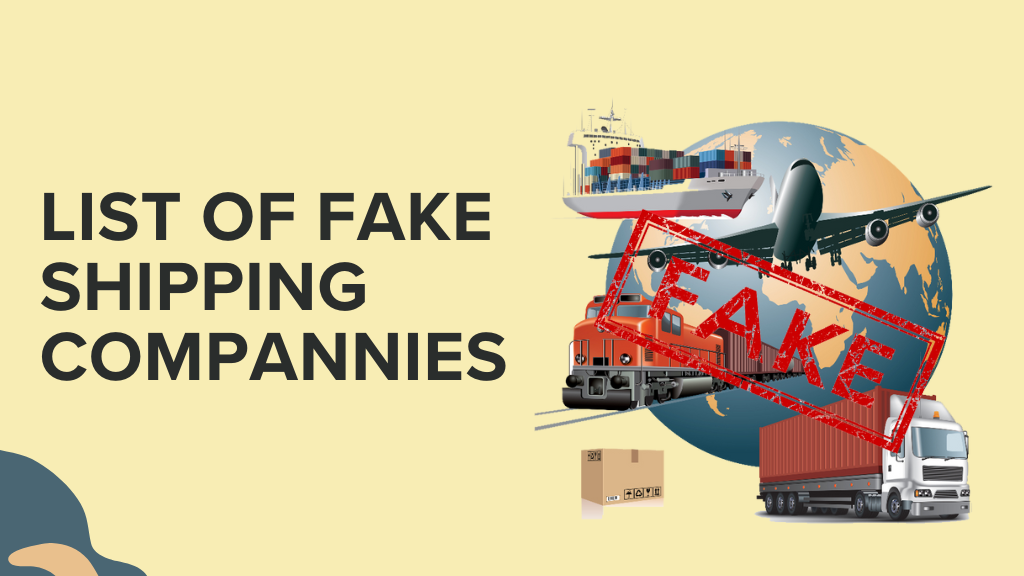The shipping industry plays a crucial role in global trade, connecting businesses and individuals worldwide. However, alongside legitimate service providers, fraudulent actors have infiltrated the industry, creating fake websites and deceptive brands to exploit unsuspecting victims. Understanding the list of fake shipping companies and how they operate is essential for safeguarding your money and personal information. These scams have become more advanced over time, making it increasingly difficult for people to distinguish between real logistics firms and fraudulent ones. In this article, we will explore how these scams work, the red flags to watch out for, examples of fake shipping companies, and practical strategies to protect yourself from falling into their traps.
Why Fake Shipping Companies Exist
Fake shipping companies thrive because online trade has grown exponentially. With millions of packages being sent across the globe daily, fraudsters see an opportunity to mimic legitimate companies and create convincing scams. Their primary aim is to steal money by promising delivery services that never exist. Some may also use the personal and financial details of victims for identity theft. These scams typically target individuals who are purchasing goods online, small businesses unfamiliar with global logistics, and even people involved in international trade. By posing as trusted names, these fake companies successfully deceive victims who assume they are dealing with genuine professionals.
Common Tactics Used by Fake Shipping Companies
Scammers behind fake shipping businesses rely on techniques that make them appear authentic. They often design professional-looking websites filled with industry jargon and fake tracking systems. Victims may be given a tracking ID that seems real but leads to a fabricated page with no actual shipment data. In some cases, fraudsters use the names of well-known logistics companies with small variations in spelling or domain name extensions, which makes it harder for people to recognize the scam immediately. Additionally, they sometimes pressure customers with urgent messages about pending deliveries, customs fees, or package holds, encouraging quick payments.
Warning Signs of a Fake Shipping Company
While scammers try to appear legitimate, there are still clear warning signs that can help you identify a fake shipping company. One major red flag is the lack of verifiable contact details. Fake companies often use generic email addresses, free web hosting, or phone numbers that cannot be traced. Another warning sign is poorly written content on their websites, which usually includes spelling mistakes and vague information about their services. Unrealistic pricing and hidden charges are also indicators that something is wrong. A genuine shipping provider will always have transparent service costs and policies. Finally, if a company demands payment only through untraceable methods like gift cards or cryptocurrency, it is almost certainly a scam.
The Global Impact of Fake Shipping Scams
The rise of fake shipping companies has serious consequences beyond individual losses. Many small businesses suffer financial setbacks when their goods are lost to scams. This not only disrupts supply chains but also damages customer trust. On a larger scale, these scams harm the reputation of the logistics industry as a whole, creating skepticism around online transactions. Authorities and industry leaders are working continuously to combat these scams by raising awareness and improving online verification systems. However, the responsibility also lies with individuals and companies to stay informed and cautious.
How to Verify a Shipping Company’s Legitimacy
Before engaging with any shipping provider, it is crucial to verify its legitimacy. Start by researching the company’s official website and cross-checking its domain name. Genuine companies typically have professional domains rather than free hosting platforms. Look for business registration numbers, customer reviews, and affiliations with recognized trade associations. You can also contact the company directly using the phone numbers listed on official records rather than those provided in suspicious emails. Authentic shipping companies are transparent with their physical addresses and offer customer service that can be verified. Taking these steps before making payments can significantly reduce the chances of becoming a victim of a scam.
Real Examples of Fake Shipping Company Names
The list of fake shipping companies continues to grow, with scammers frequently creating new websites under fresh names to avoid detection. These names often sound similar to established logistics brands, making it easy for unsuspecting customers to be tricked. Below are some known fake company names along with explanations of how they operate:
Global Express Courier
Global Express Courier is a commonly reported fake company. It uses a professional-looking website that mimics real courier services and offers fake package tracking numbers. Victims are often asked to pay unexpected customs or clearance fees before their goods can supposedly be released, but the package never exists.
Trans World Logistics
Trans World Logistics has been flagged by multiple scam awareness forums. It lures people with cheap international shipping rates and claims to operate worldwide. However, its contact numbers do not work, and the business registration details are fake. Many victims report losing payments without receiving any shipment.
United Cargo Express
United Cargo Express is another fraudulent name used by scammers. Its website usually disappears after a few weeks, only to reappear under a slightly different domain. This company typically targets small businesses importing goods from overseas, demanding upfront payments for non-existent deliveries.
FastWay Courier Services
FastWay Courier Services often pretends to handle package deliveries for online purchases. Scammers using this name send emails claiming that a parcel is waiting but requires immediate payment of handling fees. Once the money is sent, communication is cut off, leaving victims without both goods and refunds.
Oceanic Freight Lines
Oceanic Freight Lines pretends to be an international sea freight company. It targets businesses by offering bulk shipping services at suspiciously low rates. Their contracts appear professional, but once money is paid, the company disappears and leaves clients with financial losses.
These names represent only a small portion of the many fake shipping companies operating worldwide. Scammers often change names frequently, making it essential for individuals to research thoroughly before engaging with any logistics provider.
Protecting Yourself from Shipping Scams
Preventing shipping fraud requires a proactive approach. Always be cautious when dealing with new or unfamiliar logistics providers. Avoid making payments before verifying the company’s legitimacy and never share sensitive personal information with unverified sources. Using secure payment methods such as credit cards or PayPal provides an extra layer of protection, as these platforms allow disputes in case of fraud. Businesses should train employees to recognize scam tactics, such as suspicious emails claiming unpaid customs duties. By remaining vigilant and informed, both individuals and businesses can protect themselves from falling prey to fake shipping companies.
Role of Authorities and Industry Watchdogs
Governments and trade organizations are taking steps to minimize the damage caused by fraudulent logistics firms. Many countries have set up consumer protection websites where individuals can report suspected scams. International shipping associations also maintain updated warnings about ongoing fraud trends. Law enforcement agencies are working to track down the perpetrators, but because many scams are operated across borders, enforcement remains a challenge. This is why public awareness is one of the strongest defenses against these scams. The more people learn about the risks, the harder it becomes for scammers to find victims.
Why Awareness of Fake Shipping Companies is Important
Being aware of shipping scams is not just about protecting money; it is about protecting trust in the global supply chain. Scammers thrive when people are unaware of their tactics, which makes spreading knowledge essential. When consumers and businesses learn how to spot fraudulent websites, they reduce the overall success rate of scams. This creates a ripple effect, making it more difficult for fraudulent actors to continue their operations. In the long run, awareness contributes to a safer and more reliable shipping industry for everyone.
Conclusion
The shipping industry is vast and vital, but it is also vulnerable to fraudulent activities that exploit unsuspecting individuals and businesses. By understanding the list of fake shipping companies, recognizing warning signs, learning from real scam examples, and practicing safe verification methods, you can significantly reduce your risk of falling victim to scams. Remember that no matter how convincing a website or email may look, taking the time to verify its authenticity can save you from financial loss and frustration. As scammers continue to evolve their tactics, staying informed and cautious remains the best defense against fake shipping companies.
FAQs
What are fake shipping companies?
Fake shipping companies are fraudulent businesses or websites that pretend to offer logistics services but are designed to steal money or personal information from unsuspecting victims.
How can I check if a shipping company is real?
You can verify a shipping company by researching its registration details, checking customer reviews, contacting it through official channels, and confirming its membership with recognized trade associations.
Why do scammers create fake shipping companies?
Scammers create fake shipping companies to take advantage of the growing global trade market. Their main objective is to collect payments for services they never intend to deliver.
What should I do if I suspect a fake shipping company?
If you suspect a company is fake, avoid making payments, report it to local authorities, and share the information with online communities to help others avoid the scam.
Are fake shipping companies common?
Yes, fake shipping companies are becoming increasingly common due to the growth of online transactions and international trade. Scammers exploit this trend by creating fraudulent websites that look legitimate.





